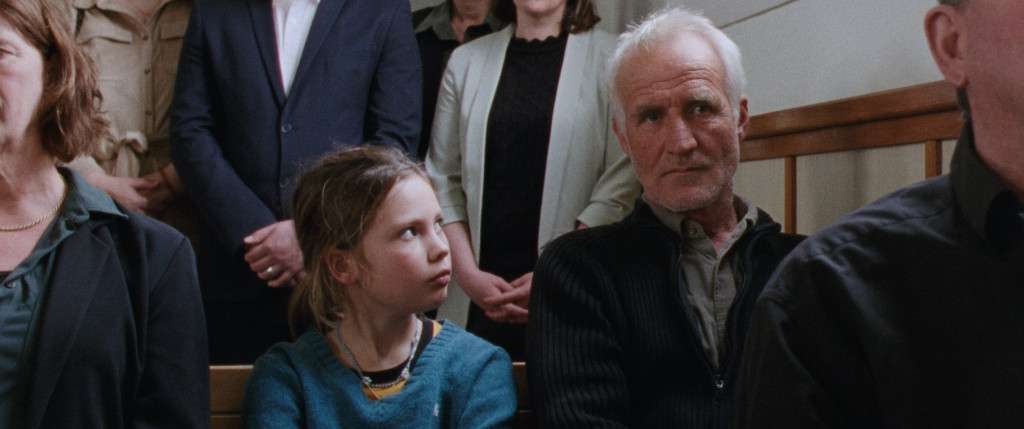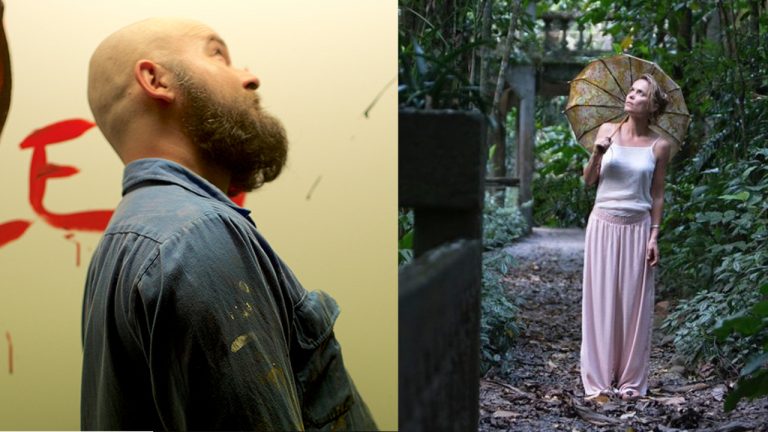In Sven Bresser’s astonishing and accomplished “Reedland” (2025), natural landscapes acquire a discomfiting, portentous image of man’s own subterranean base impulses. There are secrets and ghosts of one’s own violent underside fluttering through the natural expanse. They winnow through an internal state of being, mired in ambivalence, guilt, and searching. So much of life is caught in moving between facades and bristling reality. These negotiations produce tension. Unease stems from realisations that one’s not as pristine as imagined.
Bresser is a filmmaker confident enough to let the viewer sink into the natural rhythms of his world. In a small Dutch village near the countryside, Johan (Gerrit Knobbe, formidable and controlled) lives with his granddaughter Dana (Loïs Reinders). We aren’t exactly told why her parents are not around, except for Dana talking to her mother on the phone. Things in the village seem to be going in a predictable routine until Johan discovers a girl’s corpse, tucked behind the reed cover on his plot. Alarm is raised in the community, but a greater shift unfurls within Johan. Suddenly, he wakes up to the latent darker side everyone has. No longer is he able to look away, disengage from it.
There’s a brooding sense of moral decay, turpitude that clouds boundaries between the honest and violent. These demarcations emerge dissolute, cast in a haze of uncertainty. It’s a vision of a world haunted by sin, inability to parse good from evil, and inclinations to stray into one’s worst impulses. Bresser peeks into these spare spaces between a postured front of keeping up appearances and chinks in those widening beyond one’s seeming control. When we tumble into that zone, what are we capable of? Bresser tends not to explode into all-out, unspeakable ghastliness but a creeping morbid unease that chills our hearts.

“Reedland” is fuelled by an intractable ambiguity. It refuses to ascribe easy, simplified definitions of heroism or antagonism. Anyone can straddle the line between, tipping over at just a push. Bresser plays with these slippages, intensifying moments of doom in the everyday. One of the film’s most unsettling scenes takes place in a car. What may be a regular paternal dynamic turns several notches darker by sheer suggestion. The rain pounds harder than before, and the silence in the car seems to cut deep within. We fear the bend the scene might take. In the throes of lingering insinuations, the film gathers force. Sam du Pon’s camera keeps returning to the reeds, scanning for what lies behind. Bresser’s remarkably spare, shrewd screenplay is held in good stead by Knobbe, who keeps reconfiguring our expectations of his character’s goodness/evil.
A cloistering slow-burn, “Reedland” draws power—ugly, vicious, seething—from what we choose to bury, repress, push below thinking it cannot erupt. It’s the elemental dark lurking within ourselves that we don’t wish to confront, acknowledge, let alone fight. When we don’t want to look within, address rot closer home, we cast off blame on the other, the alien, the outsider. The murder is attributed to the Trooters on the other side of the lake. In the sleepy community, investigation happens at a glacial pace, if at all. There are other, bigger stakes to fret over. The reedlands themselves stand the peril of being abandoned. Johan is exhorted to do away with traditional cutting and take to industrial machines, but he resists it. The village’s farmers are at loggerheads with government authorities who seek to dramatically overhaul their rights, way of work, and life. Regular leasing is pulled away.
Johan is the symbol of a community rendered vulnerable. The situation demands an existential probe, a funnelling through what change one can comply with as well as reject entirely. Is stasis in a certain way of life feasible anymore? Bresser works through an atmospheric schema of conjuring tightened suspense and apprehension. It’s in moments that seem to skid from a cognition of menace to possibly acting on it that the film unravels. We sit in knots, dreading what comes next. In these amorally nebulous spaces, Reedland navigates a tussle with the soul. Executing a masterclass in intense atmospherics, Bresser situates a canny character study where the protagonist remains inscrutable. Knobbe wields both magnetic intrigue and the kind that warns us to keep our distance.
This is a terrifically controlled debut, moving in consonance with spectral natural landscapes. It hisses into the nether of man’s own repressed darkness.




![Promising Young Woman [2020] Review: A Flawed Yet Impactful Take On Rape Culture](https://79468c92.delivery.rocketcdn.me/wp-content/uploads/2021/05/PMY-768x432.jpg)
![7 Prisoners [2021] Netflix Review – An honest drama about human trafficking and the cyclic nature of its psychological traumas](https://79468c92.delivery.rocketcdn.me/wp-content/uploads/2021/11/7_-Prisoners_Prisioneiros_08_00360-768x512.jpg)

![The Endless Trench [2019] Netflix Review – An Incredible Drama on the Living Ghosts of Francoist Spain](https://79468c92.delivery.rocketcdn.me/wp-content/uploads/2020/04/The-Endless-Trench-2019-768x433.jpg)
![Mixtape [2021] Netflix Review: An Endearing Family Drama Despite Its Familiar Beats](https://79468c92.delivery.rocketcdn.me/wp-content/uploads/2021/12/Mixtape_01_28_10_10r-768x425.jpg)